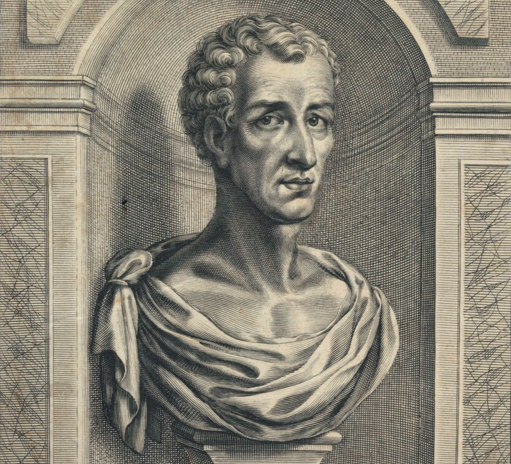
Lucian of Samosata was a Syrian-Greek satirist and writer during the second century AD. Famous for his sharp wit and eloquent satire, Lucian’s works often targeted and mocked philosophers and emerging religions, including Christianity.
In The Passing of Peregrinus (165 AD), Lucian ridicules the Cynic philosopher Peregrinus Proteus, who, at one point, converted to Christianity. In doing so, Lucian provides one of the earliest and most detailed descriptions of Christians from a critical, hostile, and non-Christian Roman source.
📜 Lucian’s Account of Early Christianity
Lucian’s satire presupposes several core facts about Christianity that were evidently common knowledge among in the Roman world:
Lucian on Christians (Quotations) Inferred Facts “The Christians, you know, worship a man to this day — the distinguished personage who introduced their novel rites, and was crucified on that account.” (Peregrinus, 11) Jesus was Crucified and Worshipped: Christianity centered on a crucified founder. “They still worship the man who was crucified in Palestine because he introduced this new cult into the world.” (Peregrinus, 13) Jesus was from Palestine: He was executed in the region of Palestine. “You see, these misguided creatures start with the general conviction that they are immortal for all time, which explains their contempt for death and voluntary self-devotion.” (Peregrinus, 11) Belief in Immortality: Christians were known for their profound belief in the afterlife and willingness to face martyrdom. “Their first lawgiver persuaded them that they are all brothers of one another, after they have transgressed once for all by denying the Greek gods and by worshipping that crucified sophist himself and living under his laws.” (Peregrinus, 13) Exclusive Brotherhood: Their community was defined by strong ties of brotherhood and a rejection of traditional Greco-Roman deities.
Lucian’s description of Jesus as a “crucified sophist” is a deliberate insult. While sophist can mean philosopher or teacher, Lucian uses it derisively — mocking Jesus as a fraud who duped “simple souls” into following him.
Yet, even through the sarcasm, Lucian highlights striking truths about early Christians: their devotion to Jesus, their belief in immortality, their communal brotherhood, and their willingness to endure persecution.
Moreover, he notes their extraordinary charity and mutual care, describing how they spared “no trouble, no expense” for their imprisoned brethren, including sending delegations and bribing jailers as shown in the following excerpt in Section 13:
“Well, when he had been imprisoned, the Christians, regarding the incident as a calamity, left nothing undone in the effort to rescue him. Then, as this was impossible, every other form of attention was shown him, not in any casual way but with assiduity, and from the very break of day aged widows and orphan children might be seen waiting about the prison. Moreover, their officials bribed the gaolers to allow them to sleep inside with him.”
“Indeed, people came even from the cities in Asia, sent by the Christians at their common expense, to succour and defend and encourage the hero. The activity of these people, in dealing with any matter that affects their community, is something extraordinary; they spare no trouble, no expense. Peregrinus, all this time, was making quite an income on the strength of his bondage; much money came to him from them by reason of his imprisonment…”
Though Lucian ridicules their generosity as gullibilit, claiming Peregrinus exploited it for profit, his testimony provides one of the earliest secular descriptions of Christian charity, devotion, and brotherhood.
🏛️ The Historical Significance of Lucian’s Satire
Historians value Lucian not for his opinions, but because his mockery confirms core facts about Christianity from a hostile source.
Lucian’s primary intent was to expose the supposed foolishness of Christians. However, by providing this testimony, his satire ironically confirms several facts of the early church:
- Jesus’s Execution and Status: Lucian confirms that the Jesus was a real person, crucified by Roman authority, yet worshipped as divine by his followers — not merely a sage, but a god-like lawgiver.
- Radical Social Ethics: He highlights the Christians’ radical social behavior: their brotherhood, servant-heartedness, and communal sharing, which sharply distinguished them from the self-focused Roman world.
- The Paradox of the Cross: Lucian’s scorn over a “crucified sophist” inadvertently captures the central theological paradox that Paul articulated a century earlier:
“But God hath chosen the foolish things of the world to confound the wise; and God hath chosen the weak things of the world to confound the things which are mighty.” (1 Corinthians 1:27)
In essence, Lucian wanted to show his sophisticated audience that Christianity was built on a foundation of foolishness, worshiping a criminal executed on a cross. Ironically, by articulating the cause of the mockery (crucifixion, worship, brotherhood, contempt of death), Lucian provides critical confirmation of the very historical data that defined and powered the early Christian movement. His sarcasm, therefore, becomes an unintended historical witness to the remarkable faith, servant-heartedness, and communal devotion that characterized early Christianity.
📚 References
- Lucian of Samosata. The Death of Peregrinus (or The Passing of Peregrinus). Section 13. “Lucian of Samosata.” Early Christian Writings. Accessed September 26, 2025.
- Image Credits: Lucian of Samosata. Wikimedia Commons. Public Domain. Available here.

Leave a Reply